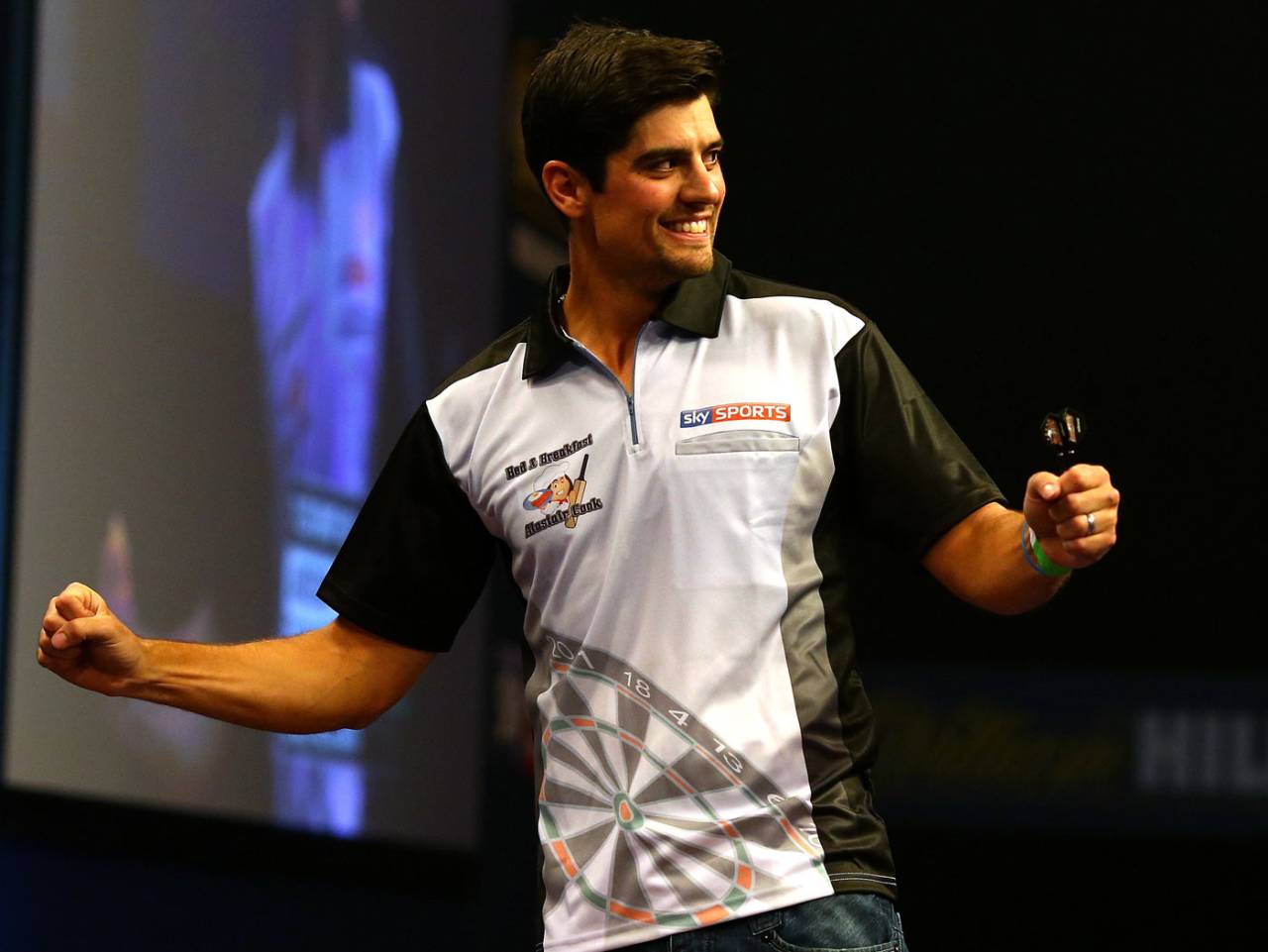What cricket can take from darts
It's simple, it's TV-friendly and it has a promoter who can tailor the product for its audience
Jon Hotten
Dec 24, 2014, 3:57 PM

Alastair Cook: finally back to winning ways, albeit in a different sport • Getty Images
Alastair Cook made a return to top-level sport on Monday evening, facing up to Jimmy Anderson in an exhibition leg at the World Darts Championship at Alexandra Palace. He won too, hitting a 140 and then taking out double 11 for the victory, proving at least that he still has the big match temperament - the Ally Pally stage and its baying crowd has turned many a hot-shot darter to jelly.
In darts' brave new TV era, each player must have a nickname, a nom de guerre, and they are in general futuristic and self-aggrandising: you may encounter The Machine, The Power, Mighty Mike, Jackpot, The Wizard and so on. There is the occasional throwback to the darting glory days of the 1970s and '80s - one particularly large competitor is known simply as "The Pie Man"; and there's the odd baffling pun, too - John Part, a Canadian, is "Darth Maple".
Thus Cook emerged with the legend "Bed and Breakfast" emblazoned on the back of his darts shirt (presumably a nod to the halcyon times when he batted all day), while his opponent was saddled with the somewhat ambiguous Jimmy "The Swinger" Anderson (let's hope it was a reference to his bowling).
The many hours that they have whiled away in distant hotel rooms practising on their mobile board were certainly not wasted. Given that they were pitched into the darting equivalent of a packed Lord's on the first day of the Ashes, the lads held their nerve and their technique, and at least demonstrated that a darts shirt looks significantly less hideous on people who genuinely are in shape.
When Martin Amis was writing London Fields, he wanted his grimy, petty criminal anti-hero Keith Talent to have aspirations towards sporting glory. At first he picked snooker but quickly changed to darts, as it was the most basic of all sports.
"What will never change about the game is its essential simplicity," Amis later wrote. "...Remove one umpire, both batsmen and all the fielders from the cricket pitch and you get some idea of the dourness of darts. Even ten-pin bowling [...] has dimensions that darts could only wonder at."
Despite this, Amis, like Cook and Anderson and another of its great fans Stephen Fry, loves the darts. It's the simplicity of the game that works, that makes it what it is. Everyone understands exactly what's happening, and the difficulty of actually throwing consistently well offers a layer of heroism to the three-dart finishes and the hundred-plus averages. It is extremely televisual too, the players' faces cradled by the screen, every tic and grimace laid bare.
The word from Sky Sports, which broadcasts the big events, is that darts now draws more viewers than cricket. That's because it is shown on prime time and, as noted, it is colourful and instantly understandable.
Yet after its first rush of popularity three decades ago, darts was on its knees. An internal schism - darts' Kerry Packer moment - meant that most of the top players left the governing body and set up on their own. The nascent Sky Sports, not yet the behemoth it would become, picked up on it as something that might fill quiet schedules.
Enter Barry Hearn, promoter of snooker and boxing, a man with a brilliant, instinctive understanding of what sports fans and broadcasters want. Hearn demands total control of all of his promotions. In snooker and darts he essentially runs the show and offers the sports as finished packages. He fills the halls, finds the sponsors, controls the players and tailors the product to its audience. He is undoubtedly a genius, and the broadcaster (in most cases Sky, although both snooker and darts also appear on free-to-air) know that he is a one-stop shop: they don't need to worry about governing bodies, players picking and choosing their schedules, or empty arenas that look bad on screen. Just ring Barry and it's done.
As the urge to return some live cricket to free-to-air television gathers momentum, it would be fascinating to know what Hearn would do with domestic T20. Michael Vaughan has floated the idea of an FA Cup-style competition in which "lower league" sides - in this case clubs and minor counties - could enter and get the chance to play the big boys.
It's the kind of contest that Hearn would know exactly how to format and market. He brings the kind of laser-like focus that the current, sprawling T20 season in England lacks. It would never happen, but the ECB could do worse than pay for a few hours of his time, just to glean an outside view.
After all, Hearn has done the impossible and managed to cheer "Bed And Breakfast" up too. "As my mates told me," Cook grinned after his victory, "that's the first hundred I've scored on TV for a while..."
Jon Hotten blogs here. @theoldbatsman